F.C. Porto
| Full name | Futebol Clube do Porto | ||||||||||||||||||||||||||
|---|---|---|---|---|---|---|---|---|---|---|---|---|---|---|---|---|---|---|---|---|---|---|---|---|---|---|---|
| Nickname(s) | Dragões (Dragons) Azuis e brancos (Blue and white) Os Tripeiros (The Gutters) Os Andrades (The Andrades- archaic nickname) |
||||||||||||||||||||||||||
| Short name | Porto | ||||||||||||||||||||||||||
| Founded | September 28, 1893 as Football Club do Porto |
||||||||||||||||||||||||||
| Ground | Estádio do Dragão Porto, Portugal (Capacity: 51,000[1]) |
||||||||||||||||||||||||||
| Chairman | |||||||||||||||||||||||||||
| Head Coach | |||||||||||||||||||||||||||
| League | Liga Sagres | ||||||||||||||||||||||||||
| 2007–08 | Liga Sagres, 1st | ||||||||||||||||||||||||||
|
|||||||||||||||||||||||||||
Futebol Clube do Porto (pron. IPA: [futɨ'bɔɫ 'klub(ɨ) du 'poɾtu]) - short: FC Porto or FCP - is a Portuguese sports club best known for its footballing endeavors. It was founded in Porto in 1893. It holds the best International record by a Portuguese team (6 international titles), having won the European Cup and the Intercontinental Cup twice each. In 2003, it brought Portugal's first UEFA Cup and in 1987 it brought Portugal's first UEFA Supercup. Domestically they hold the best record of five titles in a row, having won the Portuguese Liga 23 times, the Portuguese Cup 17 times and Portuguese Supercup 15 times (55 national titles).
The football home ground is the Estádio do Dragão, which replaced the previous home, Estádio das Antas, in 2003. FC Porto is also a leading force in other sports: the handball and basketball teams are regular contenders for the national titles and the roller hockey section is amongst the best in the sport worldwide. The new multi-sport arena near the stadium will be completed soon; in past years the non-professional home grounds were scattered around neighbouring cities (such as Gondomar, Matosinhos and Santo Tirso). Supporters and players of the club are nicknamed portistas.
It was founded in the northern city of Porto on September 28, 1893, by wine-salesman António Nicolau de Almeida' who had his first contact with the game of football on one of his trips to England. The club was revived in 1906 by Monteiro da Costa.
Commercially, the club has several stores called Loja Azul (English: Blue Store) scattered around the city, including two used with official supplier Nike. Since 1994, a merchandising goods fair called Portomania is organized during the pre-season. FC Porto publishes one of the older club-related publications in Europe: a monthly 60-page full-colour magazine called Dragões (Dragons) that has existed since the early 1980s.
FC Porto played in the Portuguese championship 74 times, playing 2048 games, winning 1333, drawing 375, losing 340, scoring 4542 goals and conceding 1909, having 3342 points as of the end of the 2007–08 season. They were also one of the founding members of the now disbanded G-14.
Contents |
The public company
After going public in 1998, FC Porto created several satellite companies around the club to improve its efficiency.
- FCPorto - Junior football, handball, rink hockey, atletism, magazine, etc.
- FCPorto - Futebol SAD and FCPorto - Basquetebol SAD (professional football and basketball)
- PortoEstádio (Estádio do Dragão)
- PortoMultimédia (official site and multimedia products)
- PortoComercial (Merchandising)
- PortoSeguro (Insurances)
The FCPorto SAD is rated in the Euronext Lisbon
Presidents
Nicolau d`Almeida, Monteiro da Costa, Dummond Villares, Carmo Pacheco, Borges de Avelar, Henrique da Mesquita, Pinto de Faria, Neves Reis, Urgel Horta, Carlos Costa, Angelo César, Ferreira Alves, Júlio Ribeiro, Cesario Bonito, Paulo Pombo, Nascimento Cordeiro, Pinto Magalhães, Américo de Sá, Pinto da Costa.
History
Its first official trophy, the "Union of the North cup", was won in 1911. In the following years it became one of the biggest clubs in Portugal and went on to win the first national competition in the history of Portuguese football, the Campeonato da Liga 1934/35. Porto were always a struggling team after that championship, so they went to win only 6 championships in 41 years of dictatorship. But after the Carnation Revolution, the history of Portuguese soccer saw a new title contestant, and a new European team. In the following years, Porto won 16 titles,10 Portuguese cups, 1 European Champions Cup and the new Champions League, 1 UEFA Cup, 1 European Super Cup, and 2 Intercontinental Cup. A wonderful rise for a team that was used to, as was said at the time, starting away games 1–0 down.
Two of the biggest reasons for this change of fortunes were Pinto da Costa who took control of Porto in 1982 and José Maria Pedroto whom he had brought back with him to manage the team. The duo quickly caused the team damage, with Pinto da Costa as football director and Pedroto as manager, winning two titles previously, and making controversial remarks about the centralization of Portuguese football, which caused them problems with the directing board, and consequently they left. After quitting, in 1982 Pinto da Costa ran for presidency and won bringing back Pedroto. The following decades turned what was the third team in the overall history of Portuguese football into the biggest title winner of the past 20 years. Since 1982, Porto has won 15 titles, achieving the record Penta (five leagues in a row) in 1999 and since 1976 never finished below 3rd place, nine Portuguese cups, and has a majority of Supercups, having won 15 out of a possible 27.
Honours
- Winners - 1934–35, 1938–39, 1939–40, 1955–56, 1958–59, 1977–78, 1978–79, 1984–85, 1985–86, 1987–88, 1989–90, 1991–92, 1992–93, 1994–95, 1995–96, 1996–97, 1997–98, 1998–99, 2002–03, 2003–04, 2005–06, 2006–07, 2007–08 (23 titles)
- Runners-up - 1935–36, 1937–38, 1940–41, 1950–51, 1953–54, 1956–57, 1957–58, 1961–62, 1962–63, 1963–64, 1964–65, 1968–69, 1974–75, 1979–80, 1980–81, 1982–83, 1983–84, 1986–87, 1988–89, 1990–91, 1993–94, 1999–00, 2000–01, 2004–05 (24 times)
Portuguese Cup :
- Winners - 1921–22, 1924–25, 1934–35, 1936–37, 1955–56, 1957–58, 1967–68, 1976–77, 1983–84, 1987–88, 1990–91, 1993–94, 1997–98, 1999–00, 2000–01, 2002–03, 2005–06 (17 titles)
- Runners-up - 1923–24, 1930–31, 1952–53, 1958–59, 1960–61, 1962–63, 1977–78, 1979–80, 1980–81, 1982–83, 1984–85, 1991–92, 2003–04, 2007–08 (14 times)
SuperCup Cândido de Oliveira
- Winners - 1981, 1983, 1984, 1986, 1990, 1991, 1993, 1994, 1996, 1998, 1999, 2001, 2003, 2004, 2006 (15 titles)
- Runners-up - 1979, 1985, 1988, 1992, 1995, 1997, 2000, 2007, 2008 (9 times)
European Cup/Champions' League
- Winners - 1986–87, 2003–04
- Winners - 1986–87
- Runners-up - 2003, 2004
- Winners - 1987, 2004
- Winners - 2002–03
- Runners-up 1983–84
Joan Gamper Trophy
- Winners - 1987
Viareggio Tournament
- Winners - 1989
Teresa Herrera Cup
- Winners - 1991
Ciudad de Sevilla Tournament
- Winners - 1992
Porto Centennial Cup
- Winners - 1993
Thailand Premier Cup
- Winners - 1997
League and Cup performances
-
Season Pos. Pl. W D L GS GA P Cup Europe Coach(es) 1934–1935 CL 1 14 10 2 2 43 19 22 semi-final Joseph Szabo 1935–1936 CL 2 14 9 2 3 50 18 20 quarter-final Mihaly 'Miguel' Siska, Maggyar, Janos Biri 1936–1937 CL 4 14 6 2 6 31 31 14 winner François Gutkas 1937–1938 CL 2 14 11 1 2 43 22 23 quarter-final Mihaly 'Miguel' Siska 1938–1939 1D 1 14 10 3 1 57 20 23 semi-final Mihaly 'Miguel' Siska 1939–1940 1D 1 18 17 0 1 76 21 34 semi-final Mihaly 'Miguel' Siska 1940–1941 1D 2 14 8 4 2 47 27 20 quarter-final Mihaly 'Miguel' Siska 1941–1942 1D 4 22 13 2 7 77 48 28 last 16 Mihaly 'Miguel' Siska 1942–1943 1D 7 18 5 4 9 40 56 14 semi-final Lipo Hertza 1943–1944 1D 4 18 10 3 5 46 36 23 quarter-final Lipo Hertza 1944–1945 1D 4 18 9 2 7 64 48 20 last 16 Lipo Hertza 1945–1946 1D 6 22 9 2 11 65 44 20 semi-final Joseph Szabo 1946–1947 1D 3 26 15 3 8 73 45 33 not held Joseph Szabo 1947–1948 1D 5 26 17 2 7 73 42 36 last 16 Carlos Nunes, Eladio Vaschetto 1948–1949 1D 4 26 16 1 9 55 37 33 quarter-final Alejandro Scopelli 1949–1950 1D 5 26 12 2 12 61 52 26 not held Augusto Silva, Artur de Sousa "Pinga", Francisco Reboredo 1950–1951 1D 2 26 15 4 7 67 32 34 2nd round Anton Vogel, Gencsi 1951–1952 1D 3 26 15 6 5 68 33 36 semi-final Eladio Vaschetto, Passarin 1952–1953 1D 4 26 16 4 6 58 35 36 final Lino Taiolli, Fernando Vaz, Cândido de Oliveira 1953–1954 1D 2 26 16 4 6 83 35 36 quarter-final Cândido de Oliveira 1954–1955 1D 4 26 12 6 8 51 34 30 2nd round Fernando Vaz 1955–1956 1D 1 26 18 7 1 77 20 43 winner Dorival Yustrich 1956–1957 1D 2 26 18 4 4 86 23 40 quarter-final ECC prel. round Flávio Costa 1957–1958 1D 2 26 21 1 4 64 25 43 winner Dorival Yustrich, José Vale, Otto Bumbel 1958–1959 1D 1 26 17 7 2 81 22 41 final Béla Guttmann 1959–1960 1D 4 26 13 4 9 48 36 30 semi-final ECC qualifying round Ettore Puricelli, Ferdinand 'Fernando' Daučík 1960–1961 1D 3 26 14 5 7 51 28 33 final Otto Vieira, Gyorgy Orth 1961–1962 1D 2 26 18 5 3 57 16 41 3rd round Gyorgy Orth, Francisco Reboredo 1962–1963 1D 2 26 19 4 3 61 24 42 quarter-final FC 1st round Jenő 'Janos' Kálmár 1963–1964 1D 2 26 16 8 2 51 20 40 final FC 1st round Jenő 'Janos' Kálmár, Artur Baeta, Otto Glória 1964–1965 1D 2 26 17 3 6 47 27 37 2nd round CWC 2nd round Otto Glória 1965–1966 1D 3 26 14 6 6 41 25 34 quarter-final FC 2nd round Flávio Costa, Virgílio Mendes 1966–1967 1D 3 26 17 5 4 56 22 39 semi-final FC 1st round José Maria Pedroto 1967–1968 1D 3 26 16 4 6 60 24 36 winner FC 1st round José Maria Pedroto 1968–1969 1D 2 26 15 7 4 39 23 37 2nd round CWC 2nd round José Maria Pedroto 1969–1970 1D 9 26 8 6 12 30 37 22 1st round FC 2nd round Elek Schwartz 1970–1971 1D 3 26 16 5 5 44 21 37 quarter-final Tommy Docherty, António Teixeira 1971–1972 1D 5 30 13 7 10 51 32 33 semi-final UC 1st round António Teixeira, Artur Baeta, Paulo Amaral, António Feliciano, António Morais 1972–1973 1D 4 30 15 7 8 56 28 37 quarter-final UC 3rd round Fernando Riera, António Feliciano 1973–1974 1D 4 30 18 7 5 43 22 43 quarter-final Béla Guttmann 1974–1975 1D 2 30 19 6 5 62 30 44 3rd round UC 2nd round Aimoré Moreira, Monteiro da Costa 1975–1976 1D 4 30 16 7 7 73 33 39 quarter-final UC 3rd round Branko Stankovic, Monteiro da Costa 1976–1977 1D 3 30 18 5 7 72 27 41 winner UC 1st round José Maria Pedroto 1977–1978 1D 1 30 22 7 1 81 21 51 final CWC quarter-final José Maria Pedroto 1978–1979 1D 1 30 21 8 1 70 19 50 1st round ECC 1st round José Maria Pedroto 1979–1980 1D 2 30 22 6 2 59 9 50 final ECC 2nd round José Maria Pedroto 1980–1981 1D 2 30 21 6 3 53 18 48 final UC 2nd round Hermann Stessl 1981–1982 1D 3 30 17 9 4 46 17 43 quarter-final CWC quarter-final Hermann Stessl 1982–1983 1D 2 30 20 7 3 73 18 47 final UC 2nd round José Maria Pedroto 1983–1984 1D 2 30 22 5 3 65 9 49 winner CWC final José Maria Pedroto 1984–1985 1D 1 30 26 3 1 78 13 55 final CWC 1st round Artur Jorge 1985–1986 1D 1 30 22 5 3 64 20 49 4th round ECC 2nd round Artur Jorge 1986–1987 1D 2 30 20 6 4 67 22 46 3rd round ECC winner Artur Jorge 1987–1988 1D 1 38 29 8 1 88 15 66 winner ECC 2nd round Tomislav Ivić 1988–1989 1D 2 38 21 14 3 52 17 56 final ECC 2nd round Tomislav Ivić 1989–1990 1D 1 34 27 5 2 72 16 59 last 16 UC 3rd round Artur Jorge 1990–1991 1D 2 38 31 5 2 77 22 67 winner ECC quarter-final Artur Jorge 1991–1992 1D 1 34 24 8 2 58 11 56 final CWC 2nd round Carlos Alberto Silva 1992–1993 1D 1 34 24 6 4 59 17 54 last 16 ECL group stage Carlos Alberto Silva 1993–1994 1D 2 34 21 10 3 56 15 52 winner ECL semi-final Bobby Robson 1994–1995 1D 1 34 29 4 1 73 15 62 semi-final CWC quarter-final Bobby Robson 1995–1996 1D 1 34 26 6 2 84 20 84 semi-final ECL group stage Bobby Robson 1996–1997 1D 1 34 27 4 3 80 24 85 semi-final ECL quarter-final António Oliveira 1997–1998 1D 1 34 24 5 5 75 38 77 winner ECL group stage António Oliveira 1998–1999 1D 1 34 24 7 3 85 26 79 last 16 ECL group stage Fernando Santos 1999–2000 1D 2 34 22 7 5 66 26 73 winner ECL quarter-final Fernando Santos 2000–2001 1D 2 34 24 4 6 73 27 76 winner UC quarter-final Fernando Santos 2001–2002 1D 3 34 21 5 8 66 34 68 quarter-final ECL 2nd group stage Octávio Machado, José Mourinho 2002–2003 1D 1 34 27 5 2 73 26 86 winner UC winner José Mourinho 2003–2004 1D 1 34 25 7 2 63 19 82 final ECL winner José Mourinho 2004–2005 1D 2 34 17 11 6 39 26 62 last 32 ECL last 16 Luigi del Neri, Victor Fernandez, José Couceiro 2005–2006 1D 1 34 24 7 3 54 16 79 winner ECL group stage Co Adriaanse 2006–2007 1D 1 30 22 3 5 65 20 69 4th round ECL last 16 Jesualdo Ferreira 2007–2008 1D 1 30 24 3 3 60 13 69* final ECL last 16 Jesualdo Ferreira
*Porto were deducted 6 points due to attempted bribery of referees in the 2003–04 season[2]
CL = Campeonato da Liga (winners weren't considered Portuguese champions); 1D = First League and predecessors (1st level)
Cup: pre-1938: Campeonato de Portugal (winners were considered Portuguese champions)
ECC / ECL = European Champion's Cup / Champions League; CWC = Cup Winner's Cup; UC = UEFA Cup ; FC = Fairs Cup
Records
- Participations in the Portuguese main division: 72
- Games played: 1988
- Games won: 1287
- Games drawn: 369
- Games lost: 332
- Goals scored: 4427 (average 2,23 per game)
- Goals conceded: 1876 (average 0,94 per game)
- Best position: Champion (22 times)
- Worst position: 9th (1969/70)
- Season with more points: 67 in 1990/91 (2 pts per win) and 86 in 2002/03 (3 pts per win)
- Player with most games: João Pinto with 407
- Player with most goals: Fernando Gomes with 288
- Manager with most games: Pedroto with 236
International titles
1987 - European Champions Cup
When Pinto da Costa joined as president, Porto was the only club from the "big three" without European honours, but that quickly changed. The first final was played against Juventus F.C. for the 1984 Cup Winners' Cup, but Porto lost. Three years later, the team led by Artur Jorge, the name hand-picked by Pedroto, won its first European honour, in a thrilling 2–1 victory over Bayern Munich in the European Cup 1986–87.
| Stage | Opponent | Home | Away |
|---|---|---|---|
| 1/16 | Rabat Ajax | 1–0 | 9–0 |
| 1/8 | TJ Vitkovice | 0–1 | 3–0 |
| 1/4 | Brøndby IF | 1–0 | 1–1 |
| 1/2 | Dinamo Kiev | 2–1 | 2–1 |
| Final | FC Bayern Munich | 2–1 | |
The following year Porto won the European Super Cup, against Ajax Amsterdam, and the Intercontinental Cup, against Peñarol, making them the first Portuguese winners of the two cups.
1988–2002
The following 16 years saw Porto as a midrange team - often in the final 16, but not progressing much further. The exception was in 1994, when Porto reached the semi-finals of the UEFA Champions League. The semi-final, decided on a single game, resulted in a heavy loss (3–0) at the hands of Johann Cruyff's FC Barcelona, in the Nou Camp.
2003 - UEFA Cup
In 2003, under the guidance of José Mourinho, Porto made a thrilling UEFA Cup run, topped with a victory in a fantastic final against Celtic in Seville.
| Stage | Opponent | Home | Away |
|---|---|---|---|
| 1/64 | KS Polonia Warszawa | 6–0 | 0–2 |
| 1/32 | FK Austria Wien | 2–0 | 1–0 |
| 1/16 | RC Lens | 3–0 | 0–1 |
| 1/8 | Denizlispor K. | 6–1 | 2–2 |
| 1/4 | Panathinaikos FC | 0–1 | 2–0 |
| 1/2 | SS Lazio | 4–1 | 0–0 |
| Final | Celtic FC | 3–2 | |
2004 - Champions League
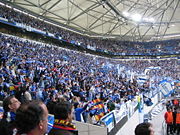
The following season set a greater challenge, but despite a slow start which included a 1–3 loss against Real Madrid, Porto never lost again in the Champions League, relegating Olympique Marseille to the UEFA Cup (where they reached the final), beating Manchester United at Old Trafford in the dying minutes of play, Olympique Lyon and Deportivo. Porto beat Monaco 3–0 in the Final played in Arena AufSchalke. Porto's UEFA Champions League winning line-up: Vitor Baia, Nuno Valente, Ricardo Carvalho, Jorge Costa(c), Paulo Ferreira, Costinha, Nuno Maniche, Pedro Mendes, Deco (Pedro Emanuel), Derlei (Benni McCarthy), Carlos Alberto Gomes (Dmitri Alenichev)
| Stage | Opponent | Home | Away |
|---|---|---|---|
| Group stage | FK Partizan Belgrade | 2–1 | 1–1 |
| Group stage | Real Madrid CF | 1–3 | 1–1 |
| Group stage | Olympique de Marseille | 1–0 | 3–2 |
| 1/8 | Manchester United FC | 2–1 | 1–1 |
| 1/4 | Olympique Lyonnais | 2–0 | 2–2 |
| 1/2 | RC Deportivo La Coruña | 0–0 | 1–0 |
| Final | AS Monaco FC | 3–0 | |
After the victory, Porto became the Portuguese side with the most European cups won - 2 CL/ECC, UEFA Super Cup plus a UEFA Cup, compared with the two ECC by Benfica and the one CWC by Sporting.
Even after the departure of José Mourinho to Chelsea FC, the club kept winning at the international level. On December 12 2004, FC Porto won the last-held Intercontinental Cup, by beating Once Caldas from Colombia 8–7 in a penalty shoot-out, after a goalless draw.
Golden Whistle affair
Under the presidency of Jorge Nuno Pinto da Costa, FC Porto was involved in the Golden Whistle affair (caso Apito Dourado) that first arose in 2004.
Stadium

F.C. Porto's home games are played at Estádio do Dragão (English: Dragon's Stadium) in Porto. Built as a replacement for Porto's old ground, Estadio das Antas, and as a venue for EURO 2004, Estádio do Dragão has an all-seated capacity of 50,948. The stadium's name is derived from the presence of a dragon on the crest of FC Porto, which is also the nickname of FC Porto fans.
Designed by Manuel Salgado and built by the Grupo Amorim, it cost €97.755.318, of which €18.430.956 was supported by the Portuguese taxpayers. To support costs, each stand carries one or two sponsor names, edp for the South (Sul) end, tmn and Sapo adsl in the East (Nascente) stand, PT and meo for the West (Poente) stand and finally Coca-Cola in the North (Norte) Stand. Away fans are placed in the left corner of the North stand, while FC Porto supporter groups (SuperDragões and Colectivo Ultras 95) are at each end, although initially both groups were in the South stand.
Current squad
|
|
Players out on loan
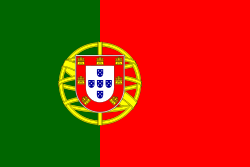 Diogo Valente - Leixões S.C.
Diogo Valente - Leixões S.C. Bruno Gama - Vitória Setúbal
Bruno Gama - Vitória Setúbal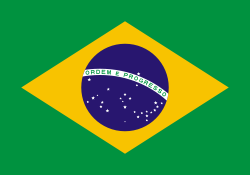 Bruno Moraes - Vitória Setúbal
Bruno Moraes - Vitória Setúbal Bruno Vale - Vitória Setúbal
Bruno Vale - Vitória Setúbal Leandro Lima - Vitória Setúbal
Leandro Lima - Vitória Setúbal Helder Barbosa - Trofense
Helder Barbosa - Trofense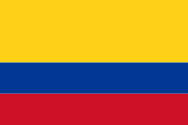 Wason Rentería - S.C. Braga
Wason Rentería - S.C. Braga
Liga Vitalis:
 Nuno André Coelho - Portimonense SC
Nuno André Coelho - Portimonense SC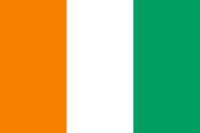 Stéphane - SC Olhanense
Stéphane - SC Olhanense André Castro - SC Olhanense
André Castro - SC Olhanense Paulo Ribeiro - SC Olhanense
Paulo Ribeiro - SC Olhanense Steven Vitória - SC Olhanense
Steven Vitória - SC Olhanense Zéquinha - FC Penafiel
Zéquinha - FC Penafiel João Pedro - FC Penafiel
João Pedro - FC Penafiel Ivanildo - FC Gil Vicente
Ivanildo - FC Gil Vicente
Other countries:
 Ibson - Flamengo
Ibson - Flamengo Paulo Machado - AS Saint-Etienne
Paulo Machado - AS Saint-Etienne Vieirinha - PAOK FC
Vieirinha - PAOK FC Claúdio Pitbull - FC Rapid Bucureşti
Claúdio Pitbull - FC Rapid Bucureşti João Paulo - FC Rapid Bucureşti
João Paulo - FC Rapid Bucureşti Edgar - FC Red Star Belgrade
Edgar - FC Red Star Belgrade Ezequias - FC Braşov
Ezequias - FC Braşov Przemyslaw Kazmierczak - Derby County
Przemyslaw Kazmierczak - Derby County
Famous players
|
1930–1979
|
1980s
|
1990s
|
2000s
|
Notes and references
- ↑ "Estádio" (in Portuguese). FC Porto.pt.
- ↑ "Porto docked points, Boavista demoted". uefa.com (9 May 2008). Retrieved on 2008-05-12.
OMER ISIK.
External links
- Official website:
- Official supporters websites:
- Unofficial websites:
- Portuguese football links:
- Portuguesefutebol.com Your source for Portuguese football (in English)
- www.PortuGOAL.net|The definitive Portuguese football site (in English)
- Soccerpulse - FC Porto Information and Discussion Forum (in English)
- Kickabola.com FC Porto and soccer forum
|
Futebol Clube do Porto
|
|||||||||||||||||||||||||||||||||||||||
|---|---|---|---|---|---|---|---|---|---|---|---|---|---|---|---|---|---|---|---|---|---|---|---|---|---|---|---|---|---|---|---|---|---|---|---|---|---|---|---|
|
|||||||||||||||||||||||||||||||||||||||
|
|||||||||||||||||||||||||||||||||||||||
|
|||||||||||||||||||||||||||||||||||||||
|
Football in Portugal
|
|||||||||||||||||||||||||||||||||||||||
|
|||||||||||||||||||||||||||||||||||||||
|
|||||||||||||||||||||||||||||||||||||||
|
Founding Members of the ECA
|
|||||||||||||||||||||||||||||||||||||||
|
Ajax • Anderlecht • Barcelona • Bayern Munich • Birkirkara • Chelsea • Copenhagen • Dinamo Zagreb • Juventus • Lyon • Manchester United • Milan • Olympiacos • Porto • Rangers • Real Madrid • Valencia |
|||||||||||||||||||||||||||||||||||||||
|
||||||||||||||
|
||||||||||||||||||||||||||||